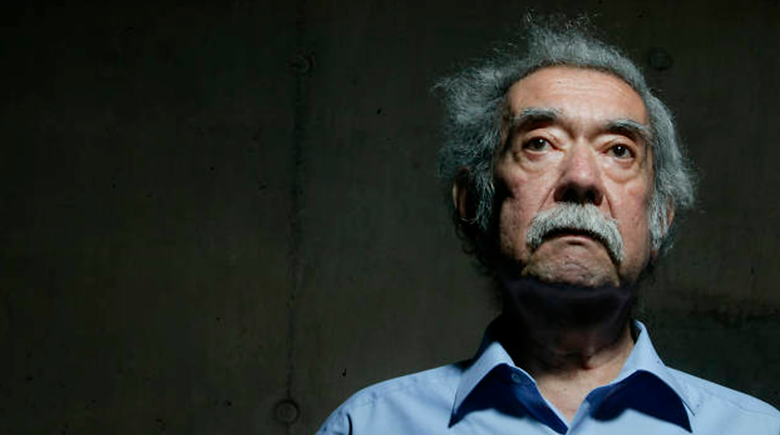
-
6 de June de 2019
Raúl Ruiz and Dialogues in Exile
The work of Chilean filmmaker Raúl Ernesto Ruiz Pino, known better as Raúl (or, as some know him, Raoul) Ruiz, is immense in all senses. Even with more than 100 titles listed, his filmography seems to stay open to additions, such as the recent rediscovery of material from his first feature, El tango del viudo (1967), which for many years was considered lost. It is further worth observing, in recognition of the oeuvre’s amplitude, that Curitiba’s principal film club, the L’Atalante Collective, hosted a small cycle of Ruiz’s work in 2016 whose selection does not overlap with Olhar’s 2019 Ruiz tribute on any film. There exist indefinite ways to approximate oneself with Ruiz’s body of work, whose list of titles is far from the most important thing to consider in understanding its effect.
Ruiz was born in 1941, in Chile, and passed away in 2011, in France. He strove to break the boundaries of traditional narrative forms through an inexhaustible search for new ways to tell stories, and accordingly became many things: Documentarist, fabulist, satirist, Expressionist, Surrealist. He left his native Chile when young to work and study in other countries, then came back to realize some of his best-known films, including the Locarno-winning Three Sad Tigers (1968). After the Pinochet-led coup d’état of 1973, however, Ruiz changed from nomad to exile (even frequently adopting this second term for himself), as did many other Chilean artists of the time who were forced to relocate. The theme of exile came to reverberate hauntingly throughout Ruiz’s prolific and epic cinema, with both political and existential dimensions.
When we decided to dedicate a part of this year’s Olhar Retrospective to Ruiz, the motif of exile helped us highlight some films from the midst of a vast ocean of titles. We settled on a cycle of eight Ruiz films throughout which exile travels in myriad ways, with the first title chronologically coming from 1968 and the last from 1983. And, upon taking this decision, we also came upon an idea as immediate as it was obvious: Exile neither was, nor is, exclusive to Ruiz, especially if we consider recent Latin American history and Brazil’s recent times in particular.
Ruiz’s first film completed in France, a work made with Chilean exiles and inspired by a Bertolt Brecht play about refugees, was called Dialogues of the Exiled (1975). With this title in mind, we felt it fruitful to place Ruiz’s circumstances in dialogue with the experiences of Brazilian filmmakers that also lived and/or worked in exile during the time of Brazil’s own military dictatorship, which ruled the country during 1964-85. We chose to spotlight multiple voices, and to try to screen films from Brazilian filmmakers that were made in exile throughout the world.
We believe that the conjunction of Ruiz’s films and those of the other directors whose works will screen at Olhar presents a kaleidoscope of ways in which exile penetrated the skin of Latin artists between the 1960s and 1980s. And we believe, most of all, that each passing moment places their experiences during these decades in further need of study, at a time when the very idea of exile has come to seem much more real and palpable here than it did even a short while ago.
We also consider it important to address the practical matter of the Retrospective’s screening copies. The Ruiz side offers seven recent digital restorations and an eighth film in remastered form, thanks to recent transnational preservation efforts from entities including the Cineteca Nacional de Chile, the Cinémathèque française, the French organization INA, and the association Les Amis de Raoul Ruiz. On the other side, the quality of the Brazilian screening copies varies greatly from one case to another. The films realized during the Brazilian dictatorship’s years by some celebrated artists such as Júlio Bressane, Glauber Rocha, and Ruy Guerra have been restored or remastered through both local and international initiatives. The other Brazilian filmmakers in the Retrospective are represented with the best available digital copies of their works, which sometimes are the only screening copies that we to know to exist. Even if the films are in fragile states, however, we consider it essential for audiences to know these works so frequently left out of readings of film history.
There were other lost or unavailable Brazilian films from the period – directed by Zózimo Bulbul, Lauro Escorel, Luiz Carlos Prestes Filho, Sílvio Tendler, and others – that could have been part of this retrospective if we had been able to locate screening copies. All this is to say that both the Ruiz and Brazilian sides of this year’s Olhar Retrospective offer incomplete portraits. We find on one side the impossible immensity of a body of work that can never be fully contained, and on the other, an equally large sense of obliteration arising from the precarious states of film preservation and circulation in our country. We therefore offer audiences a possible series, and not an ideal one – and a similar distinction could quite frequently be applied to life lived in exile.






